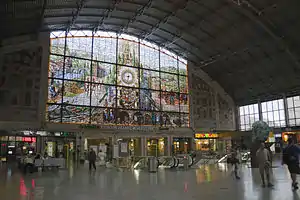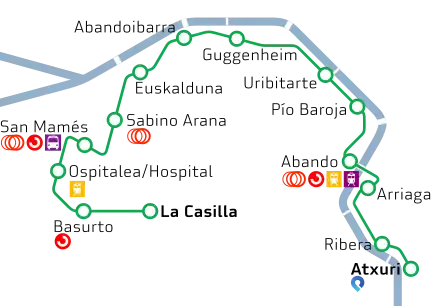Bilbao rail network | |||
|---|---|---|---|
 Vestibule of the Bilbao Abando railway station, a major interchange | |||
| Overview | |||
| Owner | Consorcio de Transportes de Bizkaia | ||
| Locale | Bilbao, Vizcaya | ||
| Transit type | Metro, Commuter rail, Tram | ||
| Website | Sistema de transporte público y zonal de Bizkaia (CTB) | ||
| Operation | |||
| Operator(s) | Metro Bilbao, Euskotren (Euskotren Trena and Euskotren Tranbia) and Renfe (Renfe Cercanías and Renfe Feve) | ||
| Technical | |||
| Track gauge | 1,000 mm (3 ft 3+3⁄8 in) (Metro Bilbao, Euskotren, Renfe Feve) 1,668 mm (5 ft 5+21⁄32 in) (Renfe Cercanías) | ||
| |||
The Spanish city of Bilbao contains a dense urban rail network served by multiple operators, track gauges and types. It is one of a very small number of cities (also including Helsinki and Tallinn) that have both narrow and broad gauge railways without any standard gauge railways.
It currently consists of thirteen lines, counting those of metro and tram as well as suburban rail; complemented by a wide-covering bus network, as well as other means of transportation including funiculars. The services are offered by different companies, whose activity is coordinated by the Consorcio de Transportes de Bizkaia (Transport Consortium of Bizkaia), which integrates their respective operators and facilitates and encourages their use.
The three major operators of the rail transport network are Metro Bilbao (2 lines), Euskotren (5 Euskotren Trena lines and 1 Euskotren Tranbia line) and Renfe (3 lines of Cercanías Bilbao and 2 of Renfe Feve). The lines converge in the capital and reach six of the seven regions of the province: Arratia-Nervión, Busturialdea-Urdaibai, Duranguesado, Gran Bilbao, Las Encartaciones and Uribe. Thus, the only region without rail lines is Lea-Artibai. Areas that lack rail service are served by Bizkaibus.

Services
Metro 

Bilbao's first metro line opened in 1995, has been expanded continually over the years and attracted a ridership of 90 million passengers in 2018.[1] Service is provided by two operators; Metro Bilbao (L1, L2) and Euskotren (L3). Interchange between the two operators is provided at Zazpikaleak/Casco Viejo station.

Commuter rail
Euskotren Trena 
Euskotren is the designation given to the metre-gauge network owned by the Basque Government. The entire 181.1-kilometre (112.5 mi) network[2] uses 1,000 mm (3 ft 3+3⁄8 in) narrow gauge rail tracks which have been owned by the Basque Government since their transferral from the Spanish government; the rail tracks and stations were part of the Feve network until its transferral. In 2018 the system carried 22,484,083 passengers.[3]
Renfe Cercanías ("Aldiriak") 

Cercanías Bilbao (Basque: Bilboko Aldiriak) is a commuter rail network in Bilbao, serving the city and its metropolitan area. It is operated by Cercanías, as part of Renfe, the national railway company. It consists of three lines, named C-1, C-2 and C-3. All three of them start at Bilbao-Abando station, which is the central station of the city. The service was used by over 10 million passengers in 2017.(2017)[4] Renfe Feve operates two commuter rail lines from Bilbao Concordia station, adjacent to Abando.
Tram 

Euskotren operates one tram line of fourteen stops in Bilbao city centre.
References
- ↑ "Metro Bilbao cierra 2018 con "récord histórico"de viajeros. Deia, Noticias de Bizkaia". Deia (in Spanish). Archived from the original on 20 January 2019. Retrieved 18 January 2019.
- ↑ "Inicio - Corporativo - Información Corporativa - Euskotren Trena - Trenes" [Home - Corporate - Corporate Information - Euskotren Trena - Trains] (in Spanish). Eskotren Trena. Archived from the original on 2014-05-19. Retrieved 2014-05-18.
- ↑ "Euskotren sigue creciendo en todas sus unidades operativas | Euskotren". www.euskotren.eus. Retrieved 20 January 2019.
- ↑ "Los trenes de cercanías van casi vacíos y apenas superan la cifra de usuarios de hace diez años". 11 June 2018. Retrieved 5 June 2019.
